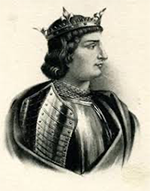Charles had married Blanche of Burgundy in 1308. She was one of those caught in the Tour de Nesle scandal in 1314 and ordered to life imprisonment. When Charles became king, he annulled his marriage to Blanche and gained another wife, Marie of Luxembourg. She died in childbirth, and Charles married Jeanne dÉvreux in 1324.

As had his brothers before him, Charles as king relied on the counsel of his uncle Charles of Valois. King Charles took steps to minimize the economic uncertainty in his realm, some of which proved troublesome to many of his subjects. At the same time, he, too, struggled against the English ruler, Edward II. Under Charles's rule, relations between the two realms descended into violence, and Edward sent his wife, Isabella, who was also Charles's sister, to find some way to stop the fighting. (In the meantime, Charles of Valois had achieved a longtime goal of French kings and regained control of Aquitaine.) Edward also sent his son Edward to pay homage to Charles on behalf of England. Isabella did indeed negotiate a truce between England and France, avoiding war between the two nations. She also took steps to start a war of her own–against her husband.
The resulting internecine conflict consumed England, allowing Charles to consolidate his position on the Continent. He entertained a military expedition into Flanders but ended up securing a diplomatic solution, then entered into protracted discussions with Pope John XXII regarding a new Crusade.
Charles IV died on Feb. 1, 1328. He did not have a male heir. He was the last surviving son of Philip V. In fact, his nearest male relative was his nephew, who was King Edward III of England. A group of French nobles chose as their next king Philip of Valois, thus ending the Capetian Dynasty. The new king was Philip VI.
First page > Louis X > Page 1, 2, 3